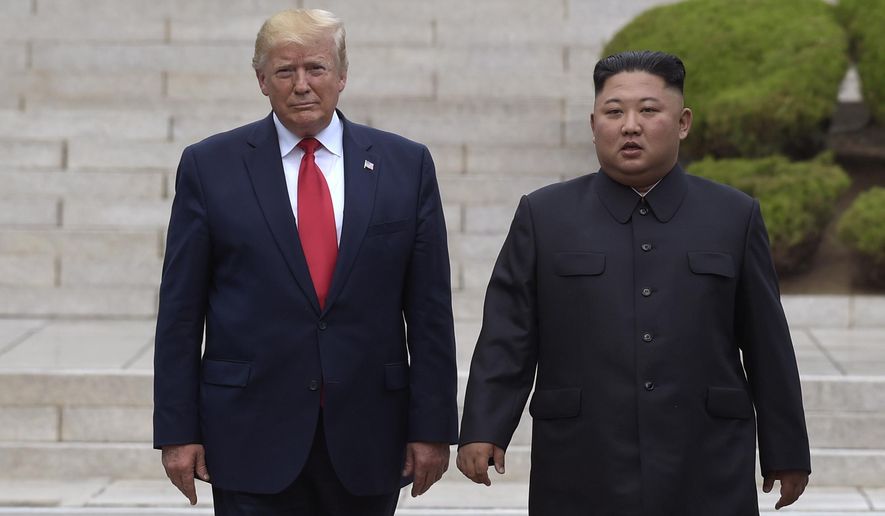The Trump administration’s maximum pressure campaign has “failed” to prevent North Korea from obtaining resources to continue developing nuclear weapons and ballistic missiles, according to an influential U.S. think tank calling for a significant revamping of the campaign.
While Pyongyang has for months demanded that President Trump ease sanctions if he wants the currently stalled nuclear talks with North Korea to resume, a new report by the Foundation for Defense of Democracies (FDD) says the U.S. should actually be doing the opposite — tightening the screws on North Korea.
Washington and its allies should more aggressively “integrate all tools of national power, including diplomacy, military, cyber, sanctions, and information and influence activities” to change the internal calculus of the regime in Pyongyang and squeeze the North Koreans toward more productive nuclear diplomacy, argues the reported released on Friday.
While its authors acknowledged that ramped up sanctions and other actions could increase tensions with North Korean leader Kim Jong Un in the short-term, they suggest “such a campaign likely represents the only way to denuclearize North Korea without resorting to war.”
“Kim Jong Un’s nuclear and missile programs represent a grave threat to the U.S. and our allies, and we cannot allow him to drag-out the status quo indefinitely,” Bradley Bowman, senior director of FDD’s Center on Military and Political Power and a co-author of the report said in a statement. “If Kim fails to demonstrate good faith with tangible steps toward relinquishing his nuclear, biological, and chemical weapons, the [U.S.] should lead an aggressive and comprehensive new pressure campaign.”
“Kim will give up his nuclear program only when he concludes that its cost to him and his regime is too great – that is, when he believes possession of nuclear weapons threatens his survival,” added co-editor David Maxwell, a former U.S. Special Forces officer and senior fellow with the think tank.
“But external pressure alone, although important, will almost certainly fail to create the right cost-benefit ratio,” Mr. Maxwell said. “It is the threat from the North Korean elite, military, and people that is most likely to cause Kim to give up his nuclear weapons.”
In an interview Friday, Mr. Maxwell told The Washington Times that such an internal threat will only manifest if the elite in Pyongyang feel the weight of a more effective pressure campaign imposed by the U.S. and its allies.
In addition to more effectively and aggressively integrating cyber, information and influence activities into the current approach to North Korea, the FDD report suggests the U.S. increase its military presence in northeast Asia. “The mere announcement of this step could create new leverage and elicit increased cooperation from Beijing and Moscow,” the report said in reference to Russia and China, which are regarded as Pyongyang’s main foreign backers.
“Washington could also initiate a diplomatic campaign to impose aggressive secondary and sectoral sanctions against Chinese and Russian persons that do business with North Korea or undermine existing sanctions,” the report said. “Beijing and Moscow are vulnerable to such sanctions.”
While some in Washington regard FDD as a hawkish think tank advocating for overly-interventionist foreign policies, Friday’s report comes amid what sources have told The Times are strong feelings within the U.S. intelligence community that Mr. Kim will not relinquish his nuclear weapons as long is he holds power in Pyongyang.
North Korea made headlines this week by repeating its assertions that the Trump administration is running out of time to salvage nuclear negotiations, saying it’s entirely up to the U.S. to choose what “Christmas gift” it gets from Pyongyang.
The statement, attributed in state media to a senior North Korean diplomat, came as Pyongyang continues to increase pressure on the U.S. and South Korea ahead of Mr. Kim’s end-of-year mandate that Washington soften its posture toward nuclear negotiations — a mandate many analysts have read as a demand for an easing of sanctions.
Negotiations have been stalled since a summit between Mr. Kim and Mr. Trump broke down in February after U.S. officials rejected Pyongyang’s demand for sweeping sanctions relief in exchange for only a partial abandonment of its nuclear capabilities. The North has since tested a series of new solid-fuel missile systems, but not carried out any nuclear bomb tests.
Many read this week’s North Korean reference to a “Christmas gift” as threat by Pyongyang that it will carry out a major missile or other test if it does not soon receive some form of sanctions relief from Washington. Some analysts suggest Mr. Kim is taking advantage of Mr. Trump, who has already sought to claim his North Korea policy as a success in a U.S. election year.
“It is hardly surprising that the North Koreans are taunting the U.S. and making it crystal clear they are not interested in more dialogue,” Frederick Carriere, a Korea expert at Syracuse University said in a statement circulated to reporters on Friday.
“Without a meaningful concession by the U.S.,” Mr. Carriere said, “why would the North Koreans agree to more talks, knowing full well that this would reinforce Trump’s threadbare claim that North Korea is one of his foreign policy successes?”
Mr. Maxwell, meanwhile, told The Times that the new FDD report is “our Christmas gift to Kim Jong Un.”
“He wants the U.S. to change policy,” Mr. Maxwell said. “Well it’s our recommendation to change policy, but in a way I don’t think Kim is going to like.”
• Guy Taylor can be reached at gtaylor@washingtontimes.com.




Please read our comment policy before commenting.